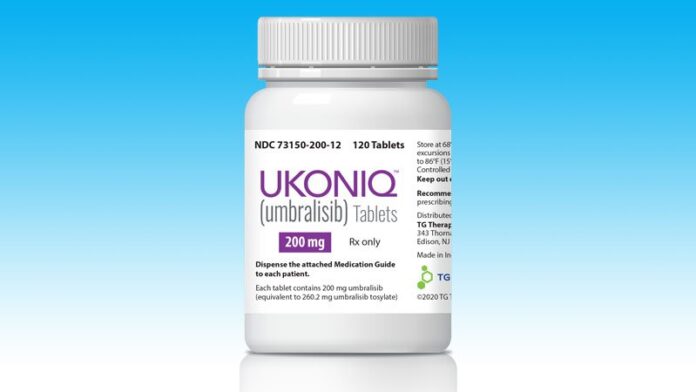[ad_1]
The US Food and Drug Administration (FDA) has granted accelerated approval to umbralisib (Ukoniq) for the treatment of adults with relapsed or refractory marginal zone lymphoma (MZL) who have received at least one prior anti-CD20-based regimen and for adults with relapsed or refractory follicular lymphoma (FL) who have received at least three prior lines of systemic therapy.
Umbralisib is the first oral, once-daily inhibitor of phosphoinositide 3 kinase delta and casein kinase 1 epsilon, according to the company.
“Despite treatment advances, MZL and FL remain incurable diseases with limited treatment options for patients who relapse after prior therapy and no defined standard of care,” said Nathan Fowler, MD, of the University of Texas MD Anderson Cancer Center, in Houston, Texas, and umbralisib investigator, in a press statement.
The approval of umbralisib “offers patients a new treatment option” in these settings, said Meghan Gutierrez of the Lymphoma Research Foundation in the same statement.
Accelerated approval was granted for the two indications on the basis of overall response rate (ORR) data from the phase 2 UNITY-NHL trial, an open-label, multicenter, multicohort study. Patients received umbralisib 800 mg once daily.
The efficacy of umbralisib monotherapy was evaluated in two single-arm cohorts within the UNITY-NHL trial: in 69 patients with MZL who had received at least one prior therapy, including an anti-CD20 regimen, and in 117 patients with FL who had received at least two prior systemic therapies, including an anti-CD20 monoclonal antibody and an alkylating agent.
The ORR, which was the primary endpoint, was 49% among patients with MZL and 43% among patients with FL. Complete responses occurred in 16% of the patients with MZL and in 3.4% of patients with FL.
Safety data included data from other cohorts, totaling 221 patients. Serious adverse reactions occurred in 18% of patients. Serious adverse reactions that occurred in ≥2% of patients included diarrhea-colitis (4%), pneumonia (3%), sepsis (2%), and urinary tract infection (2%).
The most common adverse reactions (>15%) were increased creatinine level (79%), diarrhea-colitis (58%), fatigue (41%), nausea (38%), neutropenia (33%), increased ALT level (33%), increased AST level (32%), musculoskeletal pain (27%), anemia (27%), thrombocytopenia (26%), upper respiratory tract infection (21%), vomiting (21%), abdominal pain (19%), decreased appetite (19%), and rash (18%).
Permanent discontinuation of umbralisib because of an adverse reaction occurred in 14% of patients. Dose reductions of umbralisib owing to an adverse reaction occurred in 11% of patients.
The company statement about the new drug also included information regarding a pool of 335 patients treated with umbralisib. Infections of grade 3 or higher occurred in 10%, with fatal infections occurring in <1%. Grade 3 neutropenia developed in 9%, and grade 4 neutropenia developed in 9%. Grade 3 diarrhea or colitis occurred in 9%. Elevations in transaminase level (ALT and/or AST) of grades 3 and 4 occurred in 8% and <1%, respectively.
Nick Mulcahy is an award-winning senior journalist for Medscape. He previously freelanced for HealthDay and MedPageToday and had bylines in WashingtonPost.com, MSNBC, and Yahoo. Email: [email protected] and on Twitter: @MulcahyNick.
For more from Medscape Oncology, join us on Twitter and Facebook.
[ad_2]
Source link












